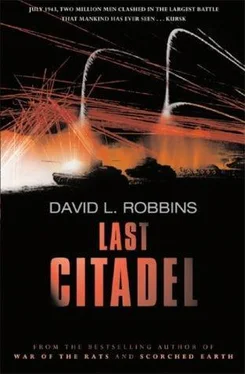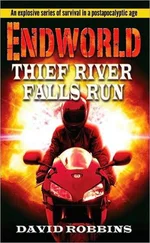Pasha nodded, like a child being assured a scary campfire story was just that, a story.
Dimitri reached to the lantern to turn up the wick. ‘Did you notice the name of your new tank? Sasha?’
Valentin, seated on the tank, sighed and this made Sasha take a moment longer.
‘General Platov.’
‘Yes. Good. I suppose you don’t know who General Platov was, so I’ll tell you.’
‘Yes,’ said Pasha, cupping his chin in his hands and digging his elbows into his bent knees. Sasha nodded. This boy did not ever seem to blink.
‘Before the War of 1812, Napoleon knew he would invade Russia. He set out to learn everything he could about the Motherland before attacking. One of the things he found out was that the Cossacks of the Don and Kuban regions were the finest riders and fighters in the world. Better than the Mongols, the British, and better than the French, of course. Napoleon needed good cavalry if he was going to build an empire, and who better than the Cossacks?’
Dimitri slapped the tank tread behind him. ‘Good old General Platov here was the hetman of the Don Cossacks. He got a letter from Bonaparte himself, inviting him to visit Paris to be His Majesty’s guest. When Platov got to France, Napoleon and all of his generals kissed his ass like he was a king himself. They showed him all the wonders of Paris, held fancy balls in his honor, even a parade! All this to get their hands on General Platov’s Cossacks. And Platov, you see, was no dummy. He knew what Bonaparte was up to.’
The lantern light reached high enough on the tank for Dimitri to see his son listening, knowing the story well but allowing the father’s gift of the telling.
‘Finally, Napoleon made his move on the General. He sat Platov down in a giant parlor of gold and silk, and said to him, “General, such a man as you should be a prince in your country. You command thousands of fighters, but you are treated with no honor by your own king. France can offer you this honor, for you and your Cossacks. Side with us, General. It would do you and your people good to become acquainted with the cultures of France and Europe.” The General kept his opinion to himself, that Napoleon had spoken as though, without French culture, his Cossacks were savages!’
Pasha and Sasha laughed. Even Valentin snickered, this was a new line Dimitri threw into the tale.
‘Napoleon made his offer. “General,” he said, “I would give anything you asked if I could have Cossacks on my side. With twenty thousand of the best cavalrymen in the world fighting with France, no one could stop us.” Platov listened, rubbed his beard, and answered, “I see no problem. This is a very easy thing to do.” Well, Napoleon could hardly believe his ears. “How can we do this, General?” he begged. “Tell me what you require.” The General stood in the grand, golden room of Napoleon and said, “It’s a simple thing. I will bring twenty thousand of my finest young riders to Paris for a few days. You will bring twenty thousand of your prettiest French girls to Paris. We will let Nature take its course, and in twenty years or so you will have your own twenty thousand French Cossacks!”‘
Dimitri spanked his knees with his hands, relishing the old General’s reply every time he told the story. Pasha and Sasha clapped and Valentin rocked back in his seat on the tank. The slanting lantern light made all their faces merry.
‘So, you see,’ Dimitri said. ‘The whole world fears the Cossack. Including Napoleon and Pasha’s mother. And the Germans.’
He leaned into the lantern, to light his face better for this next chapter of the rite. ‘My old father. Your sergeant’s grandfather. He would be here right now if he were alive. Cossack families go to war together. Did you know that?’
The two lads shook their heads.
‘Well, they do. Every Cossack family knows the history of its warriors. The family heroes are remembered with praise, the villains are the cowards or the disloyal ones. When I was your age, I went to war with my father. We wore red-topped caps and black burka cloaks with red hoods. We rode in pigskin boots and kept a tea kettle and sacks of biscuits tied to our belts. I had a curved saber, a carbine with a bayonet, and a goathorn full of powder. We rode first against the Romanovs, those inbred European shits. And when we’d won enough battles against their white cavalry all across western Russia, even on these steppe lands around us right now, the Tsar himself gave in. The Cossacks were rewarded with free land, the right to govern ourselves, and respect! Then, after a few years of royal bribes, when it was clear the Bolsheviks would win, we traded in our white flag for a red one. We turned on the bastard Tsar for the new bastard Lenin. Because the Cossack fights for the Cossack. It doesn’t matter who invades us. Germans or Russians, Tsars or commissars. Napoleon called us the disgrace of the human race. And he was right, if you look at how most humans live!’
The two boys were rapt. Dimitri understood the rotten training these two had been given before they were shipped to the Kursk bulge for their first battle. They’d been bullied and frightened and given no pay and less than a month’s lesson on how to fight in these tanks. Commissars had shouted slogans at them, they’d taken oaths, but no one had talked with them, told them tales of bravery and deeds and mentioned they might have what it takes to do the same, valiant things – podvigs . Valentin and his sour ilk were all they’d seen of the Red Army. These lads were considered nothing more than numbers to be thrown at the Germans.
Dimitri knew he could not make them into more. But if he and Valya were going to fight alongside these boys, they were going to think they were more. Or they would all die, because few die alone in a tank.
‘My father Konstantin was the best swordsman in the Kuban. Did you know a real Cossack sword has no hilt to protect the hand? Do you know why?’
No, they shrugged.
Dimitri cut his eyes to Valentin on the tank. ‘Tell us, Sergeant. About the Cossack sword.’
Valentin ran fingers over his pate. The stubble of his short hair made a fizzing noise. Dimitri held up an open hand, to say please.
Valentin cleared his throat. So needless, Dimitri thought, to be uncomfortable talking to men who may well save your life in the next week. Embrace them, Valya, he urged silently, these are spirits, children like you. Valentin gave the answer, continuing to scratch his head.
‘It… um… it’s not made for dueling. It’s made for striking from horseback.’
‘Exactly. And Pasha, Sasha, I will tell you right now with the pride of a father that your sergeant Berko there was the finest swordsman in all the Kuban when he was your age. Just eighteen, and a champion dzhigitovka! In our village, the streets are wide and there’s a great central square. That is where we hold our war games. On Sundays and holidays, the streets are lined with saplings, set thirty feet apart. On top of the trees are clay pots. The test, you see, is to gallop full bore between the trees and cut the pots with your sword. And Valentin there… well, your sergeant there, he was the best. Slashing back and forth, boys, he was a sight! A champion!’
Pasha looked up at Valentin. ‘Did you cut them off, like cutting off heads?’
Valentin appeared impatient, not with the query so much as his own past, before he became a sergeant for the Soviets. Watching his son fidget, Dimitri recalled the day when young Valya came to him and said he was going to join the army. ‘Wonderful,’ he had said, ‘we’ll go together. Yes! We’ll be in the cavalry’ And Valentin answered him, ‘No, I want to join the tanks.’ The tanks! The metal horses, slow and stupid beasts, with a cannon and armor and dials where there ought to be a pounding heart and lungs and a life under your rear, not a hard seat and a stubborn clutch. A tank instead of a horse. A Soviet instead of a champion son. Dimitri listened to Valentin’s response to the boy Pasha, and thought, He sounds like a stinking Romanov up there high on his tank.
Читать дальше












